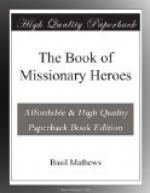King M’tesa’s eyes lighted up with desire as he saw the muskets and the ammunition. These, he thought, are the things that will make me powerful against my enemies.
“I will give you,” the Arab slave-trader went on, “one of these lengths of red cloth in exchange for one man to be sold to me as a slave; one of these guns for two men; and one hundred of these percussion caps for a woman as a slave.”
Mackay looked into the cruel face of M’tesa, and he could see how the ambitious King longed for the guns. Should he risk the favour of the King by fighting the battle of a few slaves? Yet Mackay remembered as he sat there, how Livingstone’s great fight against the slave-traders had made him, as a student, vow that he too would go out and fight slavery in Africa. The memory nerved him for the fight he was now to make.
Mackay turned to M’tesa and said words like these:[55]
“O King M’tesa, you are set as father over all your multitude of people. They are your children. It is they who make you a great King.
“Remember, O King, that the Sultan of Zanzibar himself has signed a decree that no slaves shall be taken in all these lands and sold to other lands down beyond the coast, whither this Arab would lead your children. Therefore if you sell slaves you break his law.
“Will you, then, sell your own people that they may be taken out of their homeland into a strange country? They will be chained to one another, beaten with whips, scourged and kicked, and many will be left at the wayside to die; till the peoples of the coast shall laugh at Uganda and say, ’That is how King M’tesa lets strangers treat his children!’”
We can imagine how the Arab turned and scowled fiercely at Mackay. His heart raged, and he would have given anything to plunge the dagger hidden in his robe into Mackay’s heart. Who was this white man who dared to try to stop his trade? But Mackay went on.
“See,” he said, pointing to the boys and the chiefs, “your children are wonderfully made. Their bones, which are linked together, are clothed with flesh; and from the heart in their breasts the blood that gives men life flows to and fro through their bodies, while the breath goes in and out of their lungs and makes them live. God the Father and Maker of all men alone can create such wonders. No men who ever lived could, if they worked all through their lives, make one thing so marvellous as one of these boys. Will you, then, sell one of these miracles, one of your children, for a bit of red rag which any man can make in a day?”
All eyes turned to King M’tesa to learn what he would say.
The King with a wave of his hand dismissed the scowling Arab, while he took counsel with his chiefs, and came to this decision:
“My people shall no more be made slaves.”
A decree was written out and King M’tesa put his hand to it. The crestfallen Arab and his men gathered up their guns and cloths, marched down the hill to buy ivory instead of slaves for their bales of red cloth, and went out of the dominions of King M’tesa, across the Great Lake homeward.




